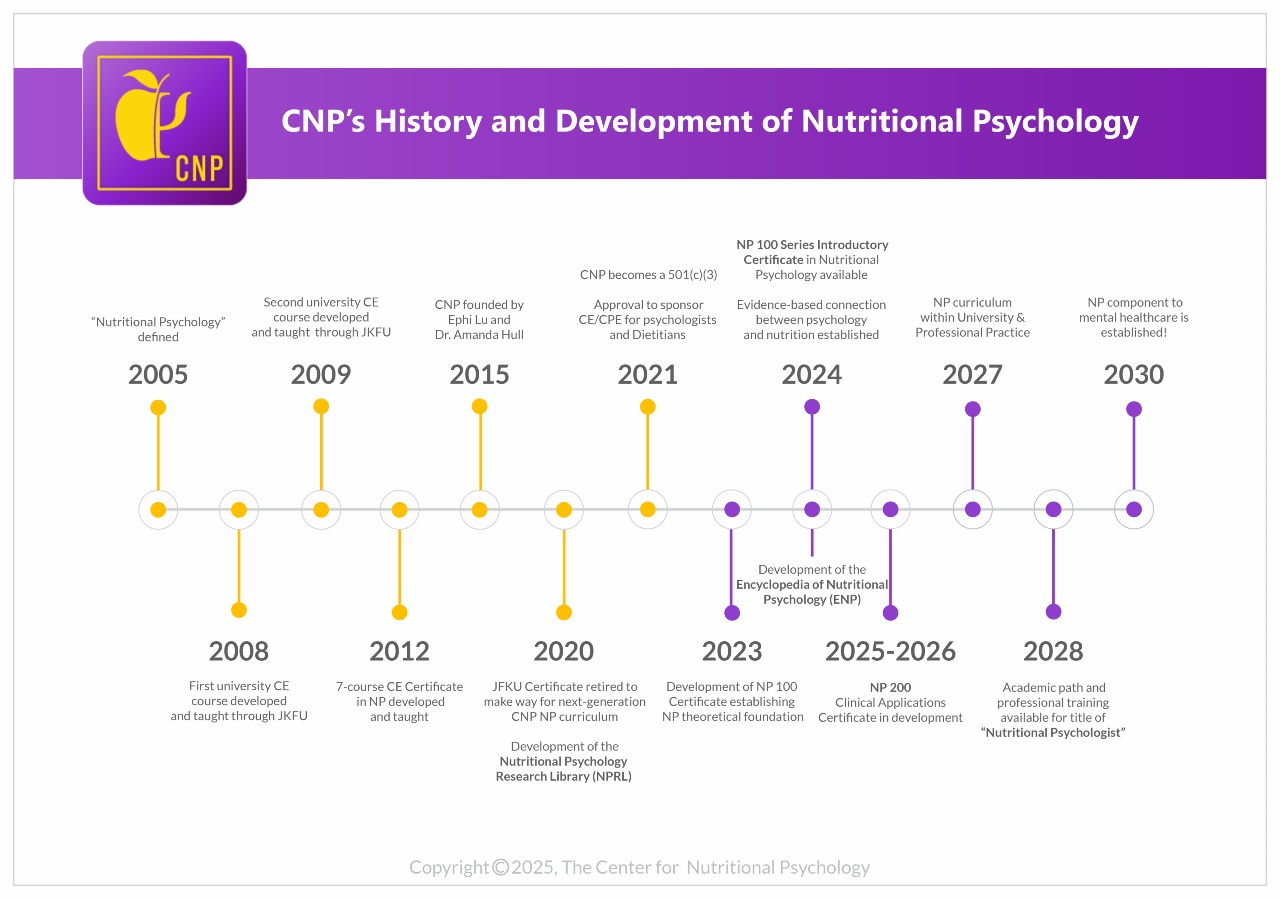 CNP's Program in Nutritional Psychology
CNP's Program in Nutritional Psychology
The Center for Nutritional Psychology (CNP) empowers professionals to understand the complex interconnections between what we eat and how we think, feel, and experience, enabling the use of nutrition as a powerful tool to support improved psychological health and well-being.
Through CNP’s groundbreaking, evidence-based psychonutritional educational program, professionals acquire practical, advanced skills that bridge the psychological and nutritional sciences, enabling them to effectively incorporate evidence-based nutrition information into their professional care within the scope of practice, thereby addressing the urgent need for a nutritional perspective in modern mental healthcare.
About The Program
CNP’s Nutritional Psychology program is designed to equip learners with a clear understanding of the connection between diet and mental health, while building practical skills applicable in both personal and professional settings.
Interprofessional collaboration between psychologists and dietitians is gaining momentum. Evidence suggests diet and nutrition can improve mental health outcomes, and there is preliminary precedent for educating professionals while maintaining clear professional boundaries.
Integrating nutrition into mental healthcare requires formalized education and training programs, an interdisciplinary language that connects the two fields, and established pathways for interprofessional collaboration. In short, mental health and nutrition have long been treated as separate fields—yet in everyday life, they constantly interact (Adan et al., 2019; Grajek et al., 2022; Van Der Pols, 2018). CNP’s Nutritional Psychology program is a formal, systematic educational program that integrates these fields and equips professionals with evidence-based knowledge and skills to better support clients’ mental health and well-being.
This program includes continuing education courses, three certificates, and a micro-degree in nutritional psychology. Learners may take continuing education courses individually within each of the three certificates. Those who complete all three certificates—Theoretical Foundations, Biological Mechanisms, and Professional Applications—earn the Micro-Degree in Nutritional Psychology.
CNP’s Nutritional Psychology program guides learners from foundational theoretical concepts through the biological mechanisms that explain the causal links between nutrition and mental health, and into the application of NP-related tools and methods in professional practice.
Explore the major psychological theories and integrative frameworks that underlie the field of NP. These include foundational models in personality, motivation, emotion, cultural influences, attachment, and behavior change, all of which influence our understanding of how dietary factors impact psychological health and well-being and can support the development of real-world interventions in eating behavior, mental health, and dietary behavior change.
Explore how nutrients and dietary patterns influence physiological processes, the gut-brain axis, neurochemical signaling, and neural pathways—impacting mood, cognition, emotional well-being, hormones, neurotransmitters, and metabolism.
Professionals who complete the NP Micro-degree are equipped to integrate psychonutritional education into their practice, helping clients understand how diet can influence mental health within their scope of work.
For mental health professionals, these skills allow for exploring aspects of one’s diet-mental health relationship, including, for example, the impact of their early attachment patterns on emotional and disordered eating, how their dietary intake may be influencing their neurological, cognitive, behavioral, brain–gut processes, and how psychological stressors may be affecting their eating habits and behaviors. Through education, clients may gain new insights, awareness, and internal motivation to engage in balanced eating and its role in strengthening their mood, resilience, and emotional well-being.
For dietitians and nutritionists, many experience that despite their clients being educated in proper dietary patterns, barriers to healthy eating often involve psychological, behavioral, cognitive, and psychosocial elements, which, if left unaddressed, impede progress in incorporating healthy eating habits. Applications of nutritional psychology can also involve educating clients on how specific dietary patterns interact with stress to drive brain changes, cravings, and eating for pleasure versus nutritional benefit, hunger, and resilience (see the generated image above).
This training broadens professionals’ knowledge of the connection between diet and mental health, increases their ability to communicate and collaborate with other professionals, fosters a shared language and evidence-based care, and enhances client support while respecting each profession’s scope of practice (see the generated image above).
Program Options and Paths
CNP offers several options for your Nutritional Psychology program. You can take individual courses, complete a certificate, or follow the pathway to earn your Micro‑Degree in Nutritional Psychology. Review your options to decide which is best for you.
Option A: Take individual courses
- Select a course from our list. This is an excellent option if you need targeted knowledge or continuing education credits.

Option B: Complete a Certificate in a specialized area
Certificate #1 — Theoretical Foundations (NP‑F)
- Courses: NP 110, NP 310, NP 320
- Focus: theoretical links between diet, nutrition, and mental health. This is an excellent option for those seeking a foundational understanding of the relationship between nutrition and mental health.
- Duration: 9 months. Each course is self-paced but must be completed within three months.
- Cost: $627 (excluding optional workbooks)
Certificate #2 — Biological Mechanisms (NP‑M)
- Courses: NP 120 Part I & II, NP 150 Part I & II
- Focus: physiology, biochemistry, microbiome, and neural pathways. This is an excellent option for those seeking a more biological understanding of the mechanisms underlying the relationship between nutrition and mental health.
- Duration: 16 months. Each course is self-paced but must be completed within four months.
- Cost: $1,077
Certificate #3 —Clinical Applications (NP‑A)
- Courses: NP 510, NP 520 Parts I & II, NP 550
- Focus: assessment, case formulation, and intervention strategies.
- Duration: TBD (in development)
- Cost: TBD (in development)

- Complete Certificates #1, #2, and #3 to earn the Micro‑Degree in Nutritional Psychology (NP‑FMA). Recommended pathway (Certificate 1 + 2 + 3).
- This is an excellent option for:
- Mental health professionals who want to expand their knowledge to provide more informed, evidence-based support for clients’ nutritionally oriented mental health and well-being.
- Nutritionists who want to develop a stronger foundation in the psychological and behavioral components of nutrition to support clients’ long-term health and lifestyle changes.
- Educators who want to bridge the gap between the psychological and nutritional sciences in the classroom.
- Students who want to gain a stronger understanding of the relationships between nutrition and mental health to prepare for a career in psychology, nutrition, or the health sciences.
CNP’s Nutritional Psychology program leverages a broad and deep evidence base, consolidating research from multiple disciplines on how diet influences psychological processes and functioning, mood, cognition, brain, sleep, stress, resilience, and overall well-being. The field is rapidly evolving to offer new models for integrating nutrition into mental healthcare. Download the My Path document to determine your journey in nutritional psychology.
Why Study Our Program at the Center for Nutritional Psychology (CNP)?
Global Nonprofit Leader:CNP is the only nonprofit 501(c)(3) educational organization dedicated to defining and developing Nutritional Psychology. Since 2015, we have pioneered the field worldwide.
Evidence-Based Curriculum:Our program is built on peer-reviewed research and developed by leading experts in psychology, nutrition, education, and functional medicine.
Approved Sponsor for Continuing EducationCNP is an approved sponsor for continuing education for licensed professionals in both disciplines. Approvals for CNP include the APA, CAMFT, CDR, and NBCC.
Building the Future of Nutritional Psychology: Through the Encyclopedia of Nutritional Psychology, Nutritional Psychology Research Libraries (NPRL), and the world’s first structured NP educational program, CNP is advancing the field with the long-term vision of integrating Nutritional Psychology into mental healthcare by 2030.
Interdisciplinary & Flexible Learning: Our program integrates psychology, nutrition, and neuroscience into a unified framework, offered 100% online and self-paced, with stackable credentials that grow with your career.
Trusted Worldwide: Our resources and programs are used by educators, healthcare providers, and researchers across multiple disciplines and countries.

Who Should Enroll in the Nutritional Psychology Program?
This program is intended for:

Students
I want cutting-edge education to prepare me for a career in psychology, nutrition, or health sciences.

Professionals
I need tools to integrate nutrition into mental health care, and psychology affects why clients resist healthy eating.

Educators
I want to bring NP into my classroom.

Researchers
I’m shaping public health frameworks for the future.

Lifelong Learners
I’m curious about how food influences how we feel.

What You’ll Gain in the Nutritional Psychology Program
- Evidence-based post-graduate level education that leads to a Micro-Degree in Nutritional Psychology
- Practical knowledge and career-ready skills in a rapidly growing field
- Shared language for interdisciplinary collaboration
- Ethical and professional practice foundations
- Critical thinking & research skills
- Stackable credentials to showcase your specialty
- A role in shaping the future of mental health through nutrition
Start Your Nutritional Psychology Program
Questions? Email: info@nutritional-psychology.org
Nutritional Psychology Program References
Stroebele-Benschop, N., Hedrih, V., Behairy, S., Pervaiz, N., & Morphew-Lu, E. (2025).
Conceptual framework for nutritional psychology as a new field of research.
Behavioral Sciences, 15(8), 1007.
https://doi.org/10.3390/bs15081007
Hedrih, V. (2025).
Can Better Collaboration Between Dietitians and Psychologists Enhance Depression Treatment?
CNP Articles in Nutritional Psychology.
https://www.nutritional-psychology.org/better-collaboration-dietitians-psychologists-depression-treatment/
Horovitz O. (2025).
Nutritional Psychology: Review the Interplay Between Nutrition and Mental Health.
Nutrition reviews, 83(3), 562–576.
https://doi.org/10.1093/nutrit/nuae158
Kiskinis, L., Morphew-Lu, E., & Gurrieri, R. (2025, May 25).
Integrating Nutrition into Mental Healthcare: Assessing Current Training, Beliefs, and Future Directions for Psychologists.
CNP Articles in Nutritional Psychology.
https://www.nutritional-psychology.org/nutrition-in-mental-healthcare-training-for-psychologists/

 Navigation
Navigation


